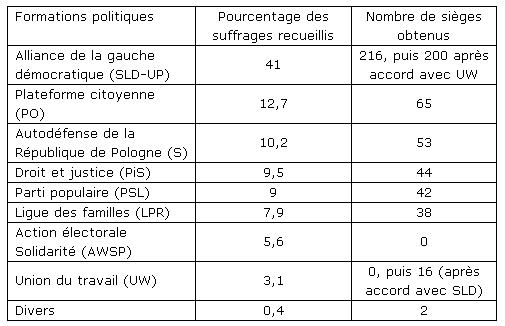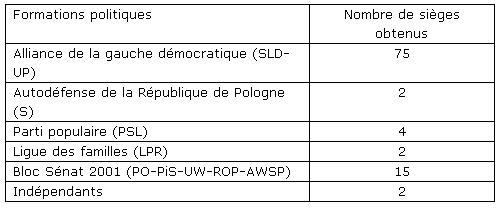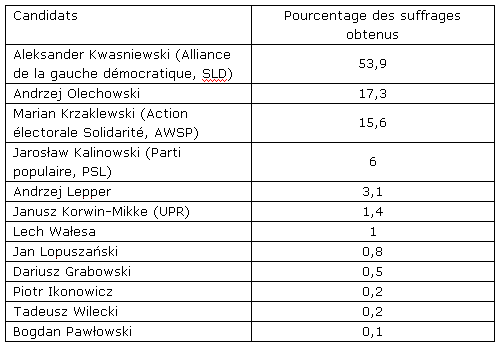News
Corinne Deloy,
Fondation Robert Schuman,
Helen Levy
-

Available versions :
EN

Corinne Deloy
Fondation Robert Schuman
Helen Levy
This autumn the Poles will renew all of their national representatives.
Firstly they will elect their members of parliament (MP's and Senators), on 25th September, then the President of the Republic on 9th October (a second round is planned if necessary on 23rd October). All of the polls forecast the downfall of the social democrats, in power since 2001 and the victory of the two liberal parties, the Civic Platform (PO) and Law and Justice (PiS). Donald Tusk, president of the Civic Platform is also the main favourite in the presidential election for which Aleksander Kwasniewski (Democratic Left Alliance, SLD), in office since 19th November 1995 cannot stand.
THE PRESIDENTIAL ELECTION
The Presidency of the Republic
The role of the President of the Republic is officially honorary. In reality he exercises significant influence. He is elected for five years and has the right to veto, which the Diet, the Lower Chamber of Parliament, can reject but the majority of three fifths of the votes and the attendance of at least half of the MP's is however required. The President of the Republic can also decide to hold a national referendum; he is the head of the armed forces, ratifies international agreements, appoints, dismisses the ambassadors and exercises and enjoys the right of reprieve by which he may annul decisions taken by the courts on appeal. The Polish Constitution stipulates that the President of the Republic can only undertake two terms of office.
In its history Poland has only had two Presidents elected by direct universal suffrage: Lech Walesa from 1990 to 1995 and Aleksander Kwasniewski elected the first time on 19th November 1995 and re-elected on 8th October 2000.
A candidate to the Presidency of the Republic must be aged at least 35 and rally at least 100,000 voters' signatures. The election is undertaken by majority vote. The first round will take place on 9th October next, i.e. two weeks after the general elections; the second round – if necessary - will take place on 23rd October.
To date thirty people are officially running for the position of President of the Republic:
- Donald Tusk, 48 years old, president of the Civic Platform (PO);
- Włodzimierz Cimoszewicz, former Prime Minister (from 15th February 1996 to 17th October 1997), former Foreign Affairs and Justice Minister, president of the Diet and the Democratic Left Alliance candidate (SLD);
- Lech Kaczynski, professor of law, leader and founder of Law and Justice (PiS) and present mayor of Warsaw (since 2002);
- Zbigniew Religa, 67 years old, cardiologist and professor of medicine, Senator for the Centre Party and independent candidate;
- Andrzej Lepper, 51 years old, leader and founder of Samoobrona (S) (1992), MP, ran for the presidential election in 1995 (1.32% of the vote) and in 2000 (3.05%) ;
- Maciej Giertych, 49 years old, standing for the League of Polish Families (LPR), MEP;
- Marek Borowski, 59 years old, former president of the Diet and leader of the Social Democrat Party of Poland (SDPL), a dissident party of the Democratic Left Alliance created in March 2004;
- Henryka Bochniarz, doctor of economy, former Economy Minister, centrist candidate for the Democratic Party, leader of Lewiatan, the Polish conference for private employers. Her candidature has the support of former Prime Minister Tadeusz Mazowiecki (24th August 1989-14th December 1990) and former Economy Minister, Jerzy Hausner;
- Leszek Bubel, extreme right candidate;
- Marek Goliszewski, business man;
- Jarosław Kalinowski, candidate standing for the Polish Popular Party (PSL);
- Janusz Korwin-Mikke, libertarian candidate;
- Waldemar Janusz Kossakowski;
- Maria Szyszkowska, feminist candidate and militant of the homosexual cause;
- Bolesław Tejkowski, nationalist, extreme rightwing candidate;
- Arnold Buzdygan ;
- Tadeusz Cichocki ;
- Liwiusz Ilasz ;
- Gabriel Janowski ;
- Kazimierz Piotrowicz ;
- Wojciech Podjacki ;
- Daniel Podrzycki ;
- Jan Pyszko ;
- Marian Rembelski ;
- Zbigniew Roliński ;
- Sławomir Salomon
- Adam Słomka ;
- Stan Tymiński ;
- Roman Włos ;
- Zbigniew Wrzesiński.
The Presidential Election Campaign
On 28th August last, Włodzimierz Cimoszewicz, with the encouragement of a number of political personalities, including the President of the Republic Aleksander Kwasniewski, Prime Minister Marek Belka and the almost-official-candidate of the Democratic Left Alliance, Jerzy Szmadzinski, accepted to run in the presidential election on 9th October next. Włodzimierz Cimoszewicz is supported by the SLD but has maintained that he would not commit himself to the campaign for the party as far as the general elections were concerned. "I am taking another route, one that is close but different. It involves neither the interests of the party nor my personal interests. It is only Poland that counts. I hope you understand that. I am counting on your support (...). Poland needs internal harmony and the solidarity of its people," he declared. His slogan is ‘Let Poland Bring Us Together'.
As soon as he started his campaign Włodzimierz Cimoszewicz took first place in the opinion polls achieving as much as 30% of the vote, but his candidature brought together the two main rightwing opposition candidates Donald Tusk (Civic Platform) and Lech Kaczynski (Law and Justice) who announced their desire to put an end to their personal disagreements and to co-operate together. They finally took the lead in the polls in August.
Ranking high in the polls in the summer, Andrzej Lepper has now lost more than 10%. The leader of Samoobrona says that he wants to launch "a pro-social policy whilst respecting our traditions and faith." The populist leader says that he is "in favour of a free market and of a social market economy" and presents his party as a ‘social liberal party'.
Although all of the polls forecast the victory of a liberal candidate after a second round in the presidential election (Donald Tusk or Lech Kaczynski), many political analysts believe that the result produced by the ‘small' parties, such as Samoobrona or the League of Families is being underestimated and that these parties might upset both the presidential and the general elections.
The Polish Political System
The Parliament comprises two Chambers: the Diet ((Sjem) that has 460 MP's and the Senate with 100 members.
The general elections take place every four years by proportional vote according to the Hondt System. A party must win at least 5% of the vote to be represented in the Diet. In towns of under 30,000 inhabitants voters only elect one MP.
The Senatorial elections take place every four years by proportional representation, since Poland is divided into forty constituencies.
The candidates must be aged at least 21 to be an MP and at least 30 years old to become a Senator. More than 11,000 people will be standing in the general elections on 25th September, i.e. twice as many as in the election on 23rd September 2001, and 624 will stand for a Senator's post.
Eight political parties are represented in the Diet at the present:
- the Democratic Left Alliance (SLD), created in 1999 by the merger of several social democrat parties, has been chaired since last June by former Agriculture Minister Wojciech Olejniczak. Some of its members are from the former Unified Workers Party (POUP);
- the Civic Platform (PO), a liberal opposition party created in 200, rallies former members of the Union of Liberty and Electoral Solidarity Action (AWS) ;
- the Social Democrat Party (SDPL) is a dissident party of the Democratic Left Alliance and was created in March 2004 and led by Marek Borowski ;
- Law and Justice (PiS) is a rightwing opposition party created in 2001;
- Auto-defence of the Republic of Poland – Samoobrona (S) is a populist party led by Andrzej Lepper ;
- the Popular Party (PSL) represents farmers' interests. It is chaired by Jaroslaw Kalinowski, deputy Prime Minister and Minister for Agriculture and Rural Development;
- the Labour Union (UW), created in 1991, led by Marek Pol, deputy Prime Minister, Minister for Amenities, is a member of the present government coalition;
- the League of Families (LPR), led by Roman Giertych, is a populist extreme rightwing party opposed to Poland's integration into the European Union.
The Campaign for the General Elections
According to all the opinion polls, the general elections on 255th September will herald the collapse of the social democrats. Although the Democratic Left Alliance only just failed to reach an absolute majority four years ago, it now lies at its lowest ebb in the polls. Some political analysts are even forecasting that the SLD might not achieve the threshold of the vital 5% to be represented in the Diet. This was the case after four years in power for Electoral Solidarity Action (AWSP) who did not win any representatives in the election on 23rd September 2001. The social democrats are the victims of the wear and tear of power but above all they have suffered due to the politico-financial corruption scandals in which a great number of its members have been involved. During its term in office the Democratic Left has witnessed the secession of some of its members who joined together in March 2004 within the Social Democrat Party led by Marek Borowski, a candidate running in the presidential election on 9th October. Prime Minister Marek Belka also left the SLD to create his own party: the Democratic Party. The most recent sign of pessimism within the social democrat troops, if any were needed, came at the end of July when a group of MP's chose to join Samoobrona in the hope of maintaining their parliamentary seats.
Everyone is expecting that the Civic Platform (PO) and Law and Justice (PiS) emerge victorious from the general elections on 25th September to create a new government coalition. Both parties of liberal orientation are ideologically close even though there have been some disagreements on major issues (healthcare, the electoral system and taxation amongst others). The Civic Platform appears to be more liberal and more European whilst Law and Justice seems to be more in favour of State involvement in the economy and aims for more sovereignty on a European level. The PiS would like to focus on two problems as soon as it takes office: corruption, creating an office to fight against corruption and national security as well as infant malnutrition, dedicating a billion zloty (247 million euro) to the problem. The Civic Platform for its part maintains that as a priority if would address taxation, privatisation and the reduction of the cost of the civil service.
On 23rd August the two liberal leaders, Donald Tusk and Lech Kaczynski, both running in the presidential election on 9th October, spoke of their differences during a dinner to celebrate the excellent results won by their respective parties in the polls; they tried to find a compromise on the subjects that divide them. The next day Donald Tusk maintained that they had come to an agreement on the fact that the party that came out first in the elections would have the right to apply its taxation programme, claims that were immediately refuted by Lech Kaczynski. The Civic Platform would like to launch a single tax band for VAT, income tax and company tax at 15%. For its part Law and Justice (PiS) suggests the reduction of tax bands to 18% and 32%. The two parties also have different opinions on the best way to stop corruption; the PiS wants to increase surveillance and the PO would like to remove administrative obstacles which it believes provides civil servants with too much power.
According to an agreement between the two liberal parties, the one that wins the general elections will take the post of Prime Minister. Jaroslaw Kaczynski (PiS), Lech Kaczynski's twin brother and Jan Rokita (PO) are at present the two favourites to become Prime Minister after the election. Jaroslaw Kaczynski has said however that he would give up this position if his brother was elected President of the Republic even if his party Law and Justice won the general election. Kazimierz Ujazdowski is the Law and Justice candidate for the post of Foreign Secretary, Jacek Saryusz-Wolski, is the Civic Platforms candidate.
During the electoral campaign Poland's relations with its Russian and Belarus neighbours have been seriously undermined. Warsaw's relations with Moscow have been particularly tense since the winter when Poland supported the Ukrainian Orange Revolution with great vigour and efficiency. In addition certain statements made by some Polish officials who qualified the elimination of the Chechen independence fighter Aslan Maskhadov as an ‘error' or Prime Minister Marek Belka's comments saying how "shocked and indignant" he was at the methods employed by the Russian armed forces in the hostage crisis at the school in Beslan infuriated the Kremlin. At the beginning of August three Polish citizens were beaten up in the streets of Moscow (a technical worker at the Polish Embassy, the second secretary of the Embassy, Marek Reszuta and finally the correspondent in Russia for the daily newspaper, Rzeczpospolita, Pawel Reszka). The Russian authorities said that the incidents "could not be dissociated from the generally poor relations between the two countries," as they commented after three children of Russian diplomats (as well as a young Kazakh) were attacked by yobs in a Warsaw park on 31st July. "We hope that independent of the pre-electoral tension the rise in anti-Russian feelings that create an atmosphere favourable to criminal attacks will cease," said the Russian Minister for Foreign Affairs.
On 1st August four MEP's, Boguslaw Sonik, Bogdan Klich, Barbara Kudrycka and the vice-President of the European Parliament, Jacek Saryusz-Wolski, who were bearers of diplomatic passports and an official invitation were denied entry to Belarus. This delegation was to meet the mayor of Grodno, a town lying on the Polish-Belarus border along with members of the Belarus opposition. As the presidential election, that is to take place in September 2006 approaches, the Belarus President, Alexander Lukashenka, is particularly nervous - just as Georgia, Ukraine and even Moldova are increasingly oriented towards the West. Alexander Lukashenka's regime is accusing the new management of the Union of Poles of Belarus – to which 25,000 of the 400,000 Poles of Belarus belong (representing 4% of the population) of obeying the USA and of conspiring to cause a revolution in his country. The government refuses to acknowledge Anzelika Borys, the new president of this association elected in March, a personality who does not belong to the government networks, and still supports the former management team whose president Tadeusz Krucz was considered as a government puppet. On 28th July last the Belarus authorities arrested several leaders of the new team and emptied the association's offices. It appears that the Polish-Belarus differences have been exacerbated by Minsk – as suggested by Iaroslav Romantchouk, vice-president of an opposition party and from a village neighbouring Grodno: "Lukashenka's propaganda is encouraging the conflict between the Poles and the Belarus populations. He is using the crisis with the Union of Poles to prove that the danger comes from Poland. This guarantees him Russia's support where anti-Polish feeling is running high."
According to the latest opinion polls undertaken by PBS and published on 23rd August, the Civic Platform would win the general elections on 25th September taking 27% of the vote, followed by Law and Justice, credited with 25%. Together these two parties would have 295 of the 460 MP's comprising the Diet and would therefore not have to look for new allies to form a government. In addition to this the two parties would be only twelve seats away from an absolute majority of two thirds of the Diet enabling them to modify the Constitution.
Samoobrona is due to win 11% of the vote, the Democratic Left Alliance, 10% just as the League of Families. No other party is due to rise beyond the 5% threshold necessary to be represented in the Diet.
In addition to this a poll undertaken by the same institute for the daily Rzeczpospolita, positions Donald Tusk, the Civic Platform candidate, first in the presidential election with 29% of the vote. He is followed by Lech Kaczynski and Wlodzimierz Cimoszewicz who are both due to win 21%. Andrzej Lepper is due to come fourth with 8% of the vote, Zbigniew Religa (5%), Marek Borowski (5% also) and Maciej Giertych (3%).The poll shows that Donald Tusk would be the winner in the second round with 54% of the vote versus Lech Kaczynski (46%) by 65% versus Wlodzimierz Cimoszewicz (35%). The latter is also due to be beaten in the second round by Lech Kaczynski (57% versus 43%).
The victory of the rightwing opposition in the Polish general elections on 25th September seems to be certain. This election and the one in Germany a week earlier might well define the outlines of a new political setting at the heart of Europe. We should note however the lack of any real European debate between the Polish political parties that do in fact have very different feelings about the European Union.
Reminder of the General Election Results on 23rd September 2001.
Participation rate: 46.3%
 Source Gazeta Wyborcza
Source Gazeta Wyborcza
Reminder of the Polish Senatorial Election Results on 23rd September 2001
Participation rate: 46.3%
 Source Gazeta Wyborcza
Source Gazeta Wyborcza
Reminder of the Presidential Election Results 8th October 2000
Participation rate: 61.1%
 Polska Agencja Prasowa
Polska Agencja PrasowaOn the same theme
To go further
Elections in Europe
Corinne Deloy
—
4 November 2025
Elections in Europe
Corinne Deloy
—
28 October 2025
Elections in Europe
Corinne Deloy
—
14 October 2025
Elections in Europe
Corinne Deloy
—
7 October 2025

The Letter
Schuman
European news of the week
Unique in its genre, with its 200,000 subscribers and its editions in 6 languages (French, English, German, Spanish, Polish and Ukrainian), it has brought to you, for 15 years, a summary of European news, more needed now than ever
Versions :



